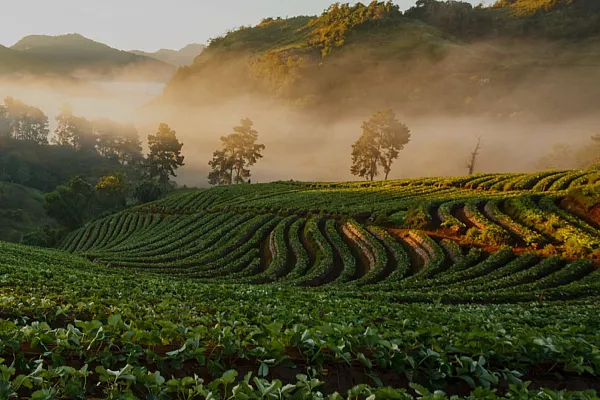
Vadose Zone Journal Focus Topics
Vadose Zone Journal (VZJ) Focus Topics collect recently published VZJ content to highlight the important gains in scientific understanding in a specific field of vadose zone research. The goal of focus topics is to increase the visibility of key scientific concepts of importance to VZJ readers, thus providing continuity and follow-through on essential research topics.
Critical Zone Research and Observatories
The vadose zone is a key compartment of the critical zone, which ranges from the top of the vegetation canopy down to groundwater. This focus topic collects research on the role of spatial patterns of key hydrological and biogeochemical states to better understand flow and transport processes at the field, hillslope, and catchment scales; dynamics of dissolved organic carbon and colloids in the critical zone; and the concept of critical zone services. Of particular interest are papers that address coupled hydrological and biogeochemical processes across critical zone compartments. It also includes new findings obtained at critical zone observatories worldwide.
Evapotranspiration
Evapotranspiration is arguably the most important component of Earth’s water balance, outside of precipitation. Evapotranspiration includes soil evaporation and plant transpiration, processes that directly influence and are influenced by soil. Evapotranspiration is measured through a variety of instruments that range in measurement scale from point (microlysimeters) to kilometers (eddy covariance, scintillometry). This focus topic reviews recent concepts and research that focus on water loss from the vadose zone through the vertically upward pathway. Research questions include how vadose zone properties—and interactions and feedbacks between processes and controls in the vadose zone, the canopy, and the atmosphere—influence evapotranspiration rates. This focus topic also includes advanced measurement techniques using instruments and isotopes to improve these estimates.
Hydrogeophysics
Hydrogeophysics is a cross-disciplinary area of research that uses geophysics to determine parameters and monitor processes for hydrological studies involving water resources, contamination, and ecological studies. This focus topic collects recent developments in hydrogeophysical methods for vadose zone research, such as electrical resistivity tomography, ground-penetrating radar, and electromagnetic induction. Applications of these methods are explored to characterize subsurface structures and derive hydraulic and biogeochemical parameters and states.
Permafrost and Cold Vadose Zone
Soil freeze–thaw affects physical and biological processes at scales ranging from the individual soil profile to vast regions. Interacting hydrological and mechanical processes alter the soil structure and control snowmelt infiltration and runoff. Soil microbial activity, nutrient cycling, and greenhouse gas emissions in permafrost regions are sensitive to soil temperature and moisture dynamics. Nutrients leached from rapidly thawed soil may affect surface and groundwater quality, especially in combination with enhanced erosion and sediment load. This focus topic will provide a platform for consideration of key aspects of soil freeze–thaw processes and related research challenges and opportunities in seasonally or permanently frozen environments.
Preferential Flow
Preferential flow is an often controlling and confounding transport mechanism in the vadose zone. This focus topic collects papers that address preferential flow and transport mechanisms through laboratory, lysimeter, field-plot, and catchment-scale studies. It presents novel findings in characterizing preferential flow paths and associated solute transport using novel measurement techniques and results from theoretical and modeling studies.
Remote Sensing of the Vadose Zone
Remote sensing techniques have become more and more important in characterizing vadose zone properties and processes and to inform vadose zone models. This focus topic collects research in the field of remote sensing and presents original fundamental or applied papers on the impact of soil on energy, water, and nutrient fluxes; catchment scale processes; vegetation cover and terrain dynamics; and calibration and validation of various remote sensing techniques for hydrological simulations at the plant, soil, and atmosphere continuum.
Soil Hydraulic Properties
Soil hydraulic properties constitute the basis for understanding flow and transport processes and are important input properties in any simulations of vadose zone properties. In this focus topic methods are presented that allow prediction and characterization of soil hydraulic properties, with an emphasis on the moisture retention characteristic and the unsaturated hydraulic conductivity.
Soil Moisture Sensor Development and Calibration
Soil moisture is a key property controlling water, energy, and mass transport processes in the vadose zone. Progress in understanding these processes is intermittently linked with the development of sensor technologies. This focus topic features articles that investigate new soil moisture sensor development, sensor calibration, comparison of sensors, new and improved calibration methods, and technology development. It presents original, basic, and applied papers on development and advancement of soil moisture measurement at techniques at lab, field, and spatial scales and across different soils and salinity gradients.
Soil–Plant and Rhizosphere processes
This focus topic features articles that investigate the rhizosphere, as well as plant and soil interactions, at the interface between soil physics, biology, hydrology, and ecology. It presents original fundamental or applied papers on the impact of soil on plants or vice-versa. Featured papers deal with energy, water, and nutrient fluxes in the soil–plant system. Of particular interest are the impact and functioning of the rhizosphere, carbon cycling, and solid, gas, and liquid fluxes between plants, soil, and the atmosphere. It also includes modeling studies that improve the understanding of the soil–plant system functioning and technical articles proposing new ways to monitor or measure the soil–plant system.
Spatial–Temporal Dynamics of Soil Moisture
Soil moisture is a highly spatially and temporally variable parameter. This focus topic addresses techniques and methods to characterize and predict spatial variability of soil moisture across scales, analysis of soil moisture patterns using theoretical and numerical modeling approaches, and upscaling of sparsely measured soil moisture content at point or farm scale up to catchment scale. This focus topic features original, basic, and applied studies on spatial–temporal dynamics of soil moisture at various scales.
Vadose Zone Models
Vadose Zone Journal has, since its inception, been an outlet for manuscripts in which numerical models have been used to support research on many different topics. This focus topic features recent articles in which numerical models are used in support of research in various hydrological, environmental, and ecological studies.
Published on behalf of
